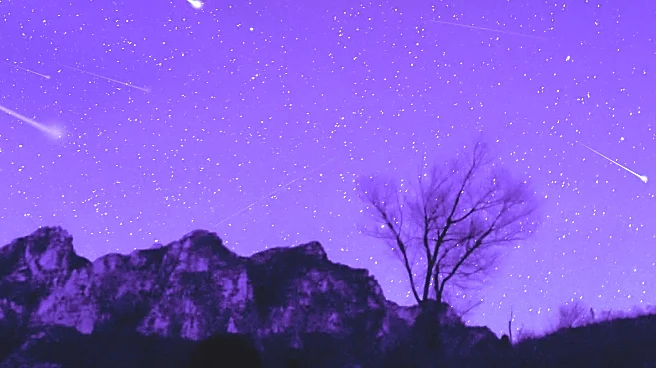What's Happening?
November is set to be an exciting month for astronomy enthusiasts with three major meteor showers lighting up the night sky. The Southern Taurids, Northern Taurids, and Leonids meteor showers are all occurring
this month, offering multiple opportunities for skywatchers to witness these celestial events. The Southern Taurids, known for their long duration and potential for bright fireballs, peaked on November 4-5. The Northern Taurids are expected to peak on November 11-12, while the Leonids, which are typically more active, will peak on November 16-17. These meteor showers originate from the Taurus and Leo constellations, respectively, and are best viewed away from city lights to avoid light pollution.
Why It's Important?
Meteor showers provide a unique opportunity for the public to engage with astronomy and appreciate the natural wonders of the night sky. These events can inspire interest in science and space exploration, particularly among young people. Additionally, meteor showers like the Leonids, which can produce intense displays, offer valuable data for scientists studying the composition and behavior of meteoroids as they enter Earth's atmosphere. The visibility of these showers can also impact tourism in areas known for clear, dark skies, potentially boosting local economies.
What's Next?
As the month progresses, skywatchers are advised to prepare for the peak of the Northern Taurids and Leonids meteor showers. Observers should find locations with minimal light pollution and allow their eyes to adjust to the darkness for optimal viewing. The Leonids, in particular, are anticipated to provide a more active display, with the potential for numerous meteors per hour. Enthusiasts are encouraged to dress warmly and be patient, as meteor activity can be unpredictable.
Beyond the Headlines
Meteor showers like these highlight the importance of preserving dark skies, which are increasingly threatened by urban light pollution. Efforts to reduce light pollution not only enhance the visibility of celestial events but also benefit ecosystems and human health. The cultural significance of meteor showers, often associated with myths and folklore, underscores their enduring impact on human imagination and storytelling.










